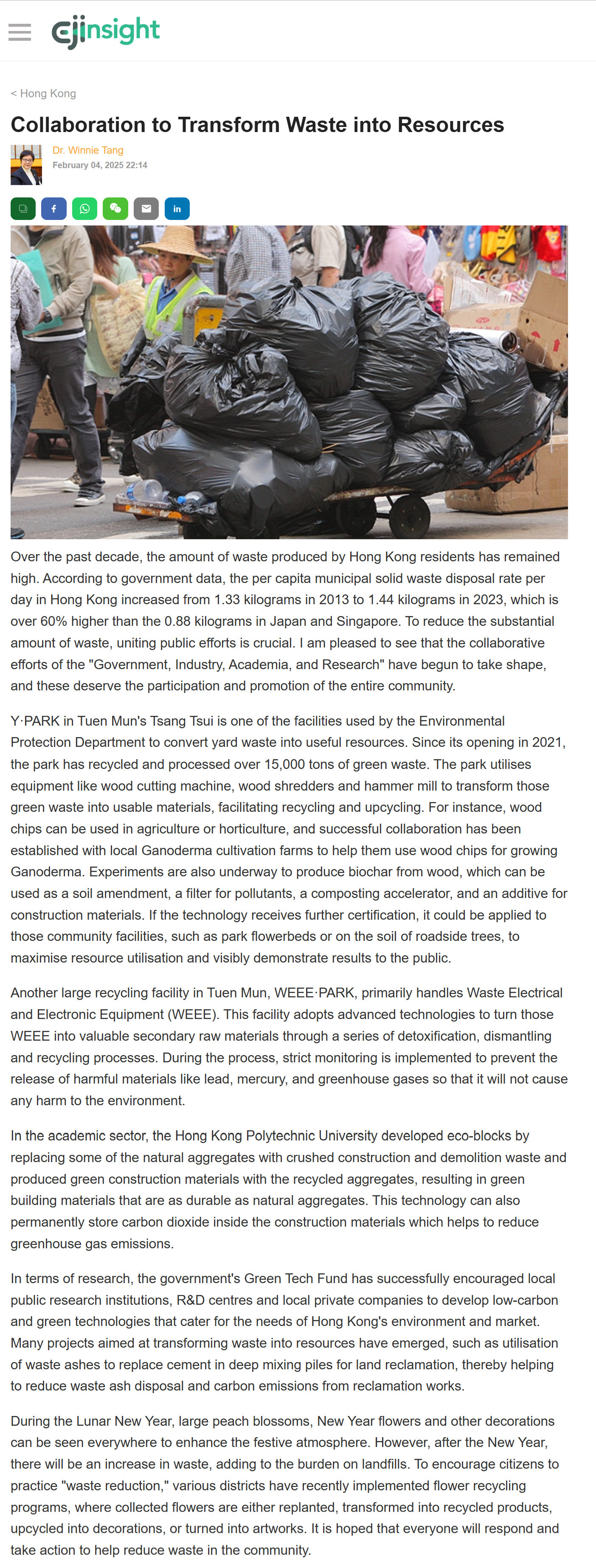網上版請按此

Collaboration to Transform Waste into Resources
Over the past decade, the amount of waste produced by Hong Kong residents has remained high. According to government data, the per capita municipal solid waste disposal rate per day in Hong Kong increased from 1.33 kilograms in 2013 to 1.44 kilograms in 2023, which is over 60% higher than the 0.88 kilograms in Japan and Singapore. To reduce the substantial amount of waste, uniting public efforts is crucial. I am pleased to see that the collaborative efforts of the "Government, Industry, Academia, and Research" have begun to take shape, and these deserve the participation and promotion of the entire community.
Y·PARK in Tuen Mun's Tsang Tsui is one of the facilities used by the Environmental Protection Department to convert yard waste into useful resources. Since its opening in 2021, the park has recycled and processed over 15,000 tons of green waste. The park utilises equipment like wood cutting machine, wood shredders and hammer mill to transform those green waste into usable materials, facilitating recycling and upcycling. For instance, wood chips can be used in agriculture or horticulture, and successful collaboration has been established with local Ganoderma cultivation farms to help them use wood chips for growing Ganoderma. Experiments are also underway to produce biochar from wood, which can be used as a soil amendment, a filter for pollutants, a composting accelerator, and an additive for construction materials. If the technology receives further certification, it could be applied to those community facilities, such as park flowerbeds or on the soil of roadside trees, to maximise resource utilisation and visibly demonstrate results to the public.
Another large recycling facility in Tuen Mun, WEEE·PARK, primarily handles Waste Electrical and Electronic Equipment (WEEE). This facility adopts advanced technologies to turn those WEEE into valuable secondary raw materials through a series of detoxification, dismantling and recycling processes. During the process, strict monitoring is implemented to prevent the release of harmful materials like lead, mercury, and greenhouse gases so that it will not cause any harm to the environment.
In the academic sector, the Hong Kong Polytechnic University developed eco-blocks by replacing some of the natural aggregates with crushed construction and demolition waste and produced green construction materials with the recycled aggregates, resulting in green building materials that are as durable as natural aggregates. This technology can also permanently store carbon dioxide inside the construction materials which helps to reduce greenhouse gas emissions.
In terms of research, the government's Green Tech Fund has successfully encouraged local public research institutions, R&D centres and local private companies to develop low-carbon and green technologies that cater for the needs of Hong Kong's environment and market. Many projects aimed at transforming waste into resources have emerged, such as utilisation of waste ashes to replace cement in deep mixing piles for land reclamation, thereby helping to reduce waste ash disposal and carbon emissions from reclamation works.
During the Lunar New Year, large peach blossoms, New Year flowers and other decorations can be seen everywhere to enhance the festive atmosphere. However, after the New Year, there will be an increase in waste, adding to the burden on landfills. To encourage citizens to practice "waste reduction," various districts have recently implemented flower recycling programs, where collected flowers are either replanted, transformed into recycled products, upcycled into decorations, or turned into artworks. It is hoped that everyone will respond and take action to help reduce waste in the community.
Dr. Winnie Tang
Adjunct Professor, Department of Computer Science, Faculty of Engineering; Department of Geography, Faculty of Social Sciences; and Faculty of Architecture, The University of Hong Kong